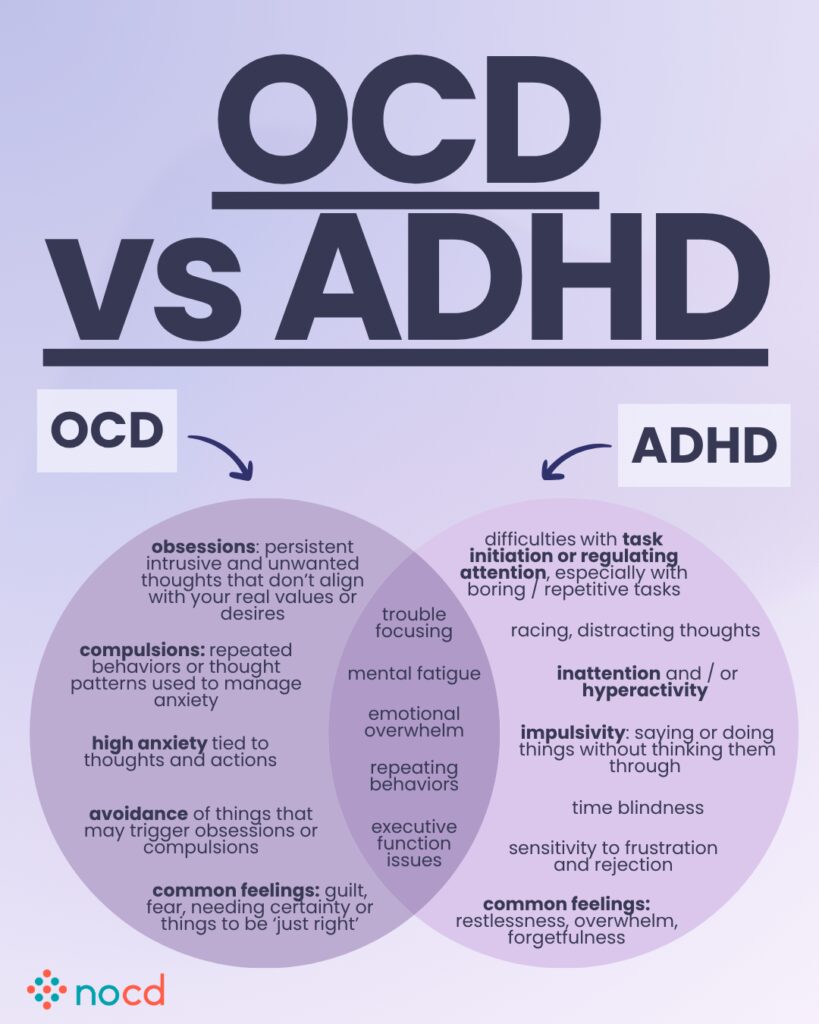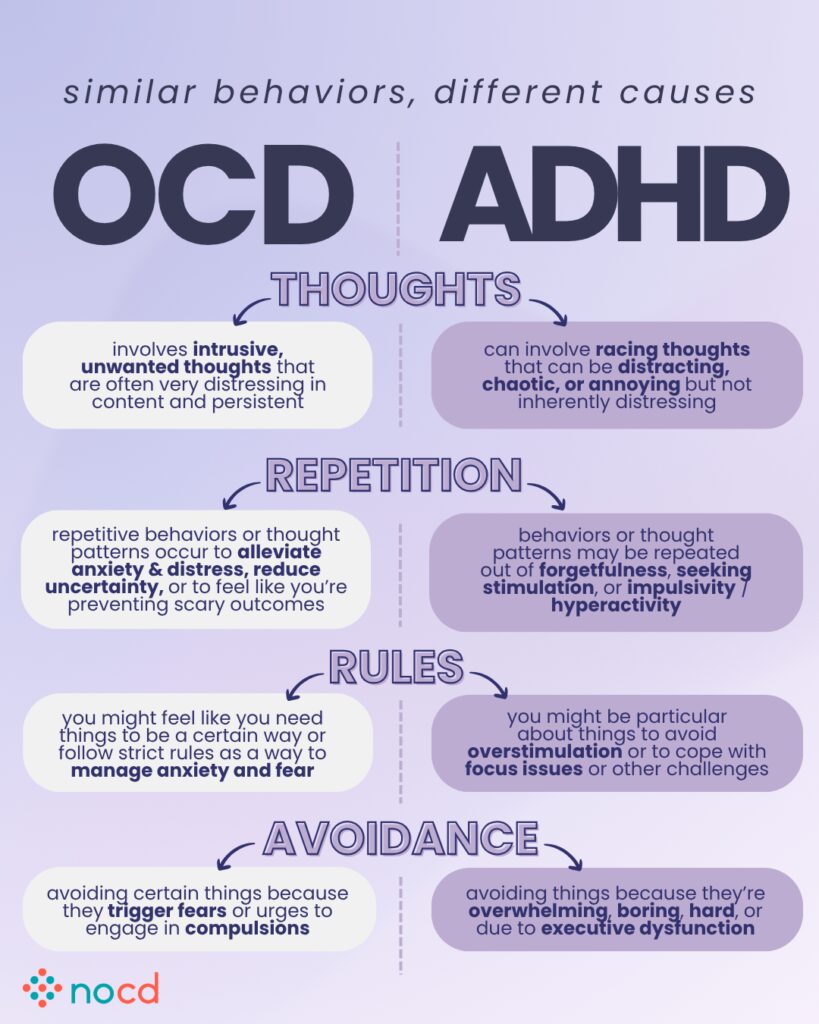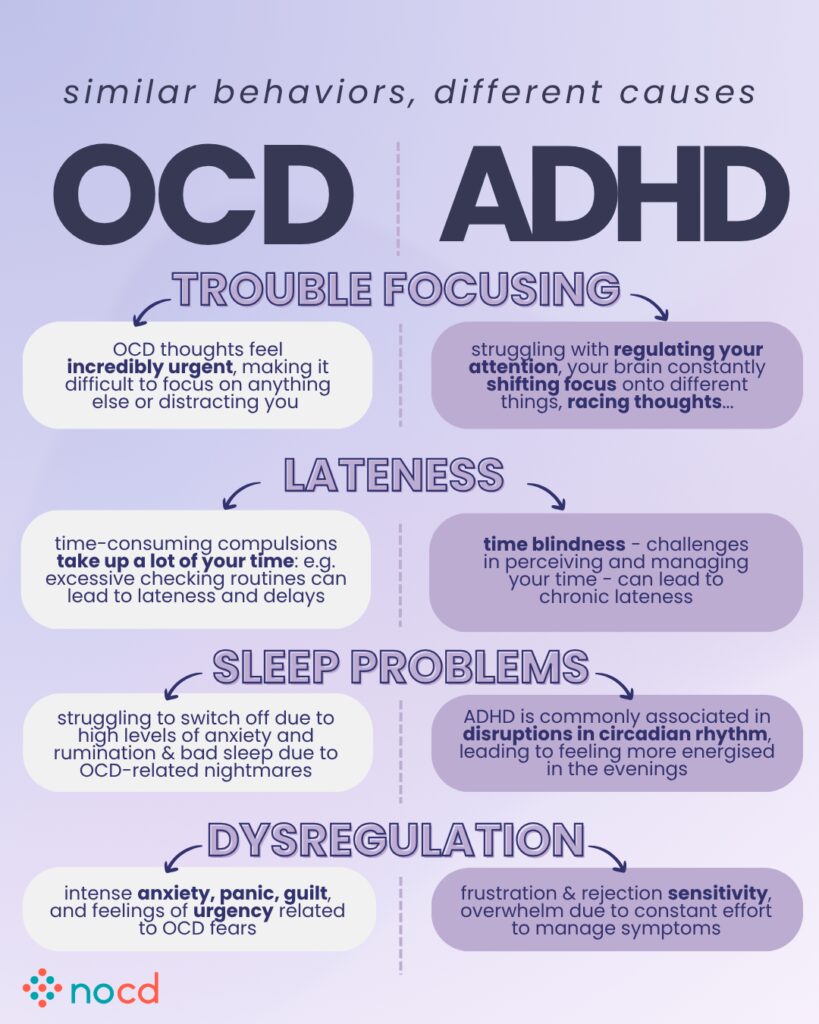Yes, obsessive-compulsive disorder (OCD) and attention-deficit hyperactivity disorder (ADHD) can co-occur, and research shows they often do. Studies estimate that 8-25% of people with OCD also have ADHD, while 8-11% of children with ADHD meet the criteria for OCD. Because symptoms can overlap or look similar on the surface, many people struggle to understand the difference—and how both conditions can be treated together.
In this guide, we’ll break down what OCD and ADHD look like, how they overlap, and how you can find the right support, especially if you’re dealing with both.
What is OCD?
OCD is a mental health condition that affects about 1 in 40 adults and 1 in 100 children. It is marked by a cycle of two symptoms:
- Obsessions: Intrusive thoughts, images, urges, feelings, or sensations that cause significant distress.
- Compulsions: Repetitive physical behaviors or mental acts done to neutralize those thoughts or reduce anxiety.
Examples include:
- Fear of harming others → Mentally reviewing every interaction
- Fear of contamination → Excessive cleaning
- Relationship doubts → Constantly seeking reassurance
What is ADHD?
ADHD is a neurodevelopmental condition that affects 5-7% of children and about 2-7% of adults worldwide.
Three main types of symptoms characterize ADHD:
- Inattention: Forgetting details, trouble organizing, easily distracted
- Hyperactivity: Restlessness, excessive talking, or fidgeting
- Impulsivity: Interrupting, risky choices, trouble with delay of gratification
ADHD can present as primarily inattentive, primarily hyperactive-impulsive, or combined type. Like OCD, it often begins in childhood but can persist into adulthood.
Can OCD and ADHD occur together?
Yes. OCD and ADHD often overlap, and many people live with both conditions.
- Between 8 and 25% of people with OCD also have ADHD.
- Between 8-11% of children with ADHD also meet the criteria for OCD.
When both are present, diagnosis and treatment can be more complex. ADHD symptoms may make OCD rituals harder to resist, while OCD symptoms can mask ADHD traits. This overlap often leads to misdiagnosis or delayed diagnosis.
How are OCD and ADHD similar?
OCD and ADHD are different conditions, but they share some overlapping traits that can cause confusion:
- Both may involve distractibility or difficulty focusing.
- Both can include repetitive behaviors or thoughts.
- Both can cause problems with executive function, such as planning and organization.
Example:
- Someone with OCD might reread an email multiple times to check for mistakes.
- Someone with ADHD might reread an email multiple times because they got distracted and lost track.
How are OCD and ADHD different?
The key difference is what drives the behavior.
- OCD: Thoughts and behaviors are driven by anxiety and fear. Compulsions are done to relieve the distress caused by intrusive thoughts.
- ADHD: Behaviors are driven by impulsivity and regulation difficulties. Distractions or forgetfulness are not connected to intrusive fears.
Example:
- OCD: Repeatedly washing hands due to a fear of contamination.
- ADHD: Forgetting to wash hands because of inattention.
Understanding these differences is crucial for accurate diagnosis and treatment.
Do ADHD medications affect OCD symptoms?
Stimulant medications for ADHD, like Ritalin, can sometimes make OCD symptoms worse—but only in rare cases. Some people may experience increased intrusive thoughts or anxiety. However, others tolerate stimulants well.
What treatment works for OCD and ADHD together?
The best treatment approach depends on tailoring care for both conditions.
OCD
The most effective treatment for OCD is exposure and response prevention (ERP) therapy. ERP is a specialized form of cognitive behavioral therapy (CBT) proven to be effective for OCD. General CBT, if not tailored for OCD, can sometimes be unhelpful or even worsen symptoms.
Studies show that ERP therapy is highly effective, with 80% of people with OCD experiencing a significant reduction in their symptoms.
Other approaches that may help include:
- Medication (typically SSRIs)
- Mindfulness-based strategies
- Acceptance and commitment therapy (ACT)
These are typically done in combination with ERP therapy, depending on the individual’s needs.
Severe or treatment-resistant OCD may benefit from the following therapies:
- Intensive outpatient programs (IOPs)
- Partial hospital programs (PHPs)
- Residential treatment centers (RTCs)
- Transcranial magnetic stimulation (TMS)
- Deep brain stimulation (DBS)
- Gamma knife radiosurgery (GKRS)
Find the right OCD therapist for you
All our therapists are licensed and trained in exposure and response prevention therapy (ERP), the gold standard treatment for OCD.
ADHD
For ADHD, medication is often the first line of treatment. Stimulants help improve focus by activating underused areas of the brain.
Other options include:
- CBT: Helps with time management, organization, and thought reframing
- Social skills training (SST): Supports communication and problem-solving in daily life
Combined approach
When both conditions are present, providers may carefully combine ERP with ADHD strategies. Coordination between therapists and prescribers is essential.
Can ADHD cause intrusive thoughts?
ADHD does not cause intrusive thoughts in the same way OCD does.
People with ADHD often describe their thoughts as rapid, scattered, or overwhelming. These thoughts may arise unexpectedly, making it difficult to concentrate.
However, they usually don’t come with the same level of fear, guilt, or compulsive urges seen in OCD.
Think of it this way:
- ADHD = “brain won’t slow down”
- OCD = “brain won’t let go of a specific intrusive thought”
That said, if you’re unsure whether your thoughts are ADHD-related or obsessive, an evaluation from a licensed mental health professional can help you sort it out.
Next steps if you think you have both OCD and ADHD
If you suspect you may have OCD, ADHD, or both, the best next step is a professional evaluation.
- Schedule an assessment with a licensed mental health professional.
- Discuss your history of symptoms, including when they began and how they impact your daily life.
- Rule out overlaps with other conditions such as anxiety disorders, depression, or autism spectrum disorder.
- Seek specialized care: Treatment for both conditions is possible, and outcomes are often positive when care is tailored.
Bottom line
If your mind feels like it’s spinning in every direction—or getting stuck on distressing thoughts—you’re not alone. OCD and ADHD are both common, treatable, and manageable with the right support.
Reach out to a licensed mental health provider who can help you sort through your symptoms and create a personalized treatment plan. With the right care, you can feel more focused, present, and in control.
Key takeaways
- ADHD can cause intrusive thoughts, but they’re typically fast-moving and distracting rather than distressing and compulsive, like in OCD.
- OCD and ADHD often overlap, and as many as 1 in 4 people with OCD may also have ADHD.
- While both conditions impact focus and behavior, OCD is driven by internal anxiety and compulsions, whereas ADHD is driven by impulsivity and inattention.
- Treating both OCD and ADHD is possible, often involving ERP for OCD and a combination of medication and CBT for ADHD.




